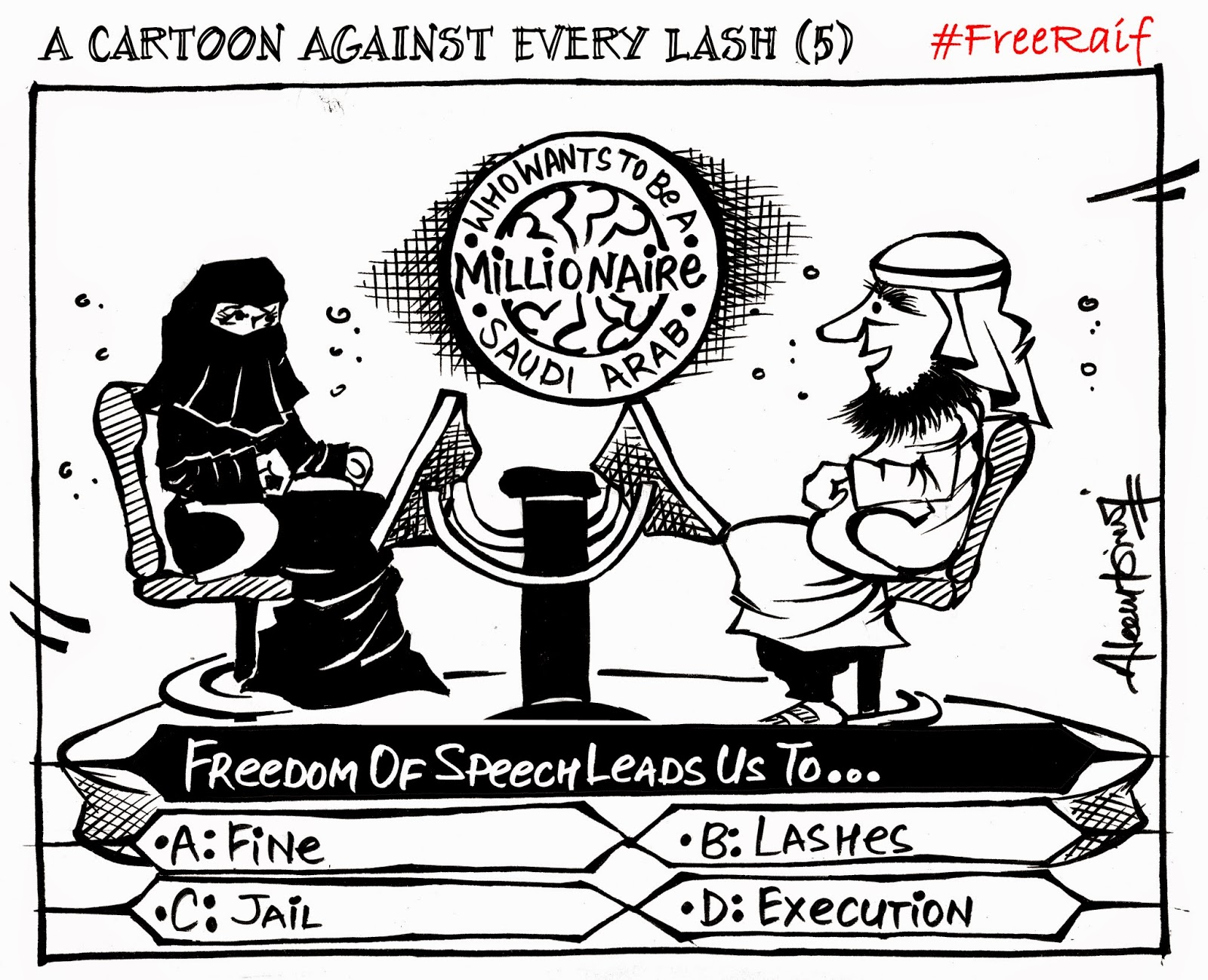Just two days after 11 journalists from the French satire magazine Charlie Hebdo were brutally killed in their office by terrorists, Raif Badawi, a Saudi Arabian writer and activist was tied up in front of a mosque and received 50 lashes for allegedly “insulting” Islam.
Badawi ran a website which is a discussion forum for liberals from the Islamic state ruled by monarchs. In May 2014, he was found guilty of breaking Saudi Arabia’s strict technology laws and insulting religion through his online forum. He was sentenced to 10 years in jail and 1,000 lashes, as well as a fine of 1 million riyals.
Since the first round of lashing, Raif is reported to be suffering from high blood pressure and other health problems,which apparently has resulted in the doctors asking the government to postpone his punishment of 50 lashes every week.
Ever since the news spread, many activists around the world have come together and launched protests, petitions and movements to petition the Saudi government to do away with his punishment. Aseem Trivedi, who was charged with sedition in 2012 and arrested for his cartoons, is among those who are registering their protest.
“I have decided to create one cartoon against each lash they gave him,” says Trivedi who has decided to create 50 cartoons in support of Badawi. “It is regressive that creative artists are facing punishments for just expressing one’s opinion which can’t get any worse.”
Trivedi adds that cartoons aren’t going to be enough and the movement to free Raif Badawi needs international persuasion. “A cartoonist can only make cartoons but the United Nations and other organisations can create enough pressure,” he argues. “If it had happened in our country, the government would have had to back down on its punishment in the light of these protests. But, nobody talks about human rights there or freedom of expression. All the conversations are about their oil and Kings.”
The cartoons specifically target Sharia law in Saudi Arabia and highlight the need of freedom of speech which would protect people from punishment for expressing themselves. “The cartoons may look specific to Raif’s case but they deal with a universal problem,” Trivedi explains. “The idea of freedom of speech doesn’t mean anything if it is not absolute. People have the right to feel offended but not physically harm the creator just because of a disagreement.”
Trivedi adds that artists and activists around the world should converge on protests against punishment for Raif Badawi and protect freedom of expression. ”We have to do it, because then only somebody would do it for us if we get attacked,” he argues. ”I came to know people drew for me when I was in jail and that’s all the motivation a struggling person needs sometimes.”
Here’s a look at the six cartoons he has so far posted on his blog:
Badawi ran a website which is a discussion forum for liberals from the Islamic state ruled by monarchs. In May 2014, he was found guilty of breaking Saudi Arabia’s strict technology laws and insulting religion through his online forum. He was sentenced to 10 years in jail and 1,000 lashes, as well as a fine of 1 million riyals.
Since the first round of lashing, Raif is reported to be suffering from high blood pressure and other health problems,which apparently has resulted in the doctors asking the government to postpone his punishment of 50 lashes every week.
Ever since the news spread, many activists around the world have come together and launched protests, petitions and movements to petition the Saudi government to do away with his punishment. Aseem Trivedi, who was charged with sedition in 2012 and arrested for his cartoons, is among those who are registering their protest.
“I have decided to create one cartoon against each lash they gave him,” says Trivedi who has decided to create 50 cartoons in support of Badawi. “It is regressive that creative artists are facing punishments for just expressing one’s opinion which can’t get any worse.”
Trivedi adds that cartoons aren’t going to be enough and the movement to free Raif Badawi needs international persuasion. “A cartoonist can only make cartoons but the United Nations and other organisations can create enough pressure,” he argues. “If it had happened in our country, the government would have had to back down on its punishment in the light of these protests. But, nobody talks about human rights there or freedom of expression. All the conversations are about their oil and Kings.”
The cartoons specifically target Sharia law in Saudi Arabia and highlight the need of freedom of speech which would protect people from punishment for expressing themselves. “The cartoons may look specific to Raif’s case but they deal with a universal problem,” Trivedi explains. “The idea of freedom of speech doesn’t mean anything if it is not absolute. People have the right to feel offended but not physically harm the creator just because of a disagreement.”
Trivedi adds that artists and activists around the world should converge on protests against punishment for Raif Badawi and protect freedom of expression. ”We have to do it, because then only somebody would do it for us if we get attacked,” he argues. ”I came to know people drew for me when I was in jail and that’s all the motivation a struggling person needs sometimes.”
Here’s a look at the six cartoons he has so far posted on his blog:






Limited-time offer: Big stories, small price. Keep independent media alive. Become a Scroll member today!
Our journalism is for everyone. But you can get special privileges by buying an annual Scroll Membership. Sign up today!